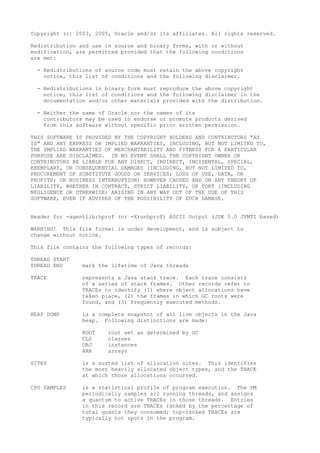Jvm.hprof
- 1. Copyright (c) 2003, 2005, Oracle and/or its affiliates. All rights reserved. Redistribution and use in source and binary forms, with or without modification, are permitted provided that the following conditions are met: - Redistributions of source code must retain the above copyright notice, this list of conditions and the following disclaimer. - Redistributions in binary form must reproduce the above copyright notice, this list of conditions and the following disclaimer in the documentation and/or other materials provided with the distribution. - Neither the name of Oracle nor the names of its contributors may be used to endorse or promote products derived from this software without specific prior written permission. THIS SOFTWARE IS PROVIDED BY THE COPYRIGHT HOLDERS AND CONTRIBUTORS "AS IS" AND ANY EXPRESS OR IMPLIED WARRANTIES, INCLUDING, BUT NOT LIMITED TO, THE IMPLIED WARRANTIES OF MERCHANTABILITY AND FITNESS FOR A PARTICULAR PURPOSE ARE DISCLAIMED. IN NO EVENT SHALL THE COPYRIGHT OWNER OR CONTRIBUTORS BE LIABLE FOR ANY DIRECT, INDIRECT, INCIDENTAL, SPECIAL, EXEMPLARY, OR CONSEQUENTIAL DAMAGES (INCLUDING, BUT NOT LIMITED TO, PROCUREMENT OF SUBSTITUTE GOODS OR SERVICES; LOSS OF USE, DATA, OR PROFITS; OR BUSINESS INTERRUPTION) HOWEVER CAUSED AND ON ANY THEORY OF LIABILITY, WHETHER IN CONTRACT, STRICT LIABILITY, OR TORT (INCLUDING NEGLIGENCE OR OTHERWISE) ARISING IN ANY WAY OUT OF THE USE OF THIS SOFTWARE, EVEN IF ADVISED OF THE POSSIBILITY OF SUCH DAMAGE. Header for -agentlib:hprof (or -Xrunhprof) ASCII Output (JDK 5.0 JVMTI based) WARNING! This file format is under development, and is subject to change without notice. This file contains the following types of records: THREAD START THREAD END mark the lifetime of Java threads TRACE represents a Java stack trace. Each trace consists of a series of stack frames. Other records refer to TRACEs to identify (1) where object allocations have taken place, (2) the frames in which GC roots were found, and (3) frequently executed methods. HEAP DUMP is a complete snapshot of all live objects in the Java heap. Following distinctions are made: ROOT root set as determined by GC CLS classes OBJ instances ARR arrays SITES is a sorted list of allocation sites. This identifies the most heavily allocated object types, and the TRACE at which those allocations occurred. CPU SAMPLES is a statistical profile of program execution. The VM periodically samples all running threads, and assigns a quantum to active TRACEs in those threads. Entries in this record are TRACEs ranked by the percentage of total quanta they consumed; top-ranked TRACEs are typically hot spots in the program.
- 2. CPU TIME is a profile of program execution obtained by measuring the time spent in individual methods (excluding the time spent in callees), as well as by counting the number of times each method is called. Entries in this record are TRACEs ranked by the percentage of total CPU time. The "count" field indicates the number of times each TRACE is invoked. MONITOR TIME is a profile of monitor contention obtained by measuring the time spent by a thread waiting to enter a monitor. Entries in this record are TRACEs ranked by the percentage of total monitor contention time and a brief description of the monitor. The "count" field indicates the number of times the monitor was contended at that TRACE. MONITOR DUMP is a complete snapshot of all the monitors and threads in the System. HEAP DUMP, SITES, CPU SAMPLES|TIME and MONITOR DUMP|TIME records are generated at program exit. They can also be obtained during program execution by typing Ctrl- (on Solaris) or by typing Ctrl-Break (on Win32).

